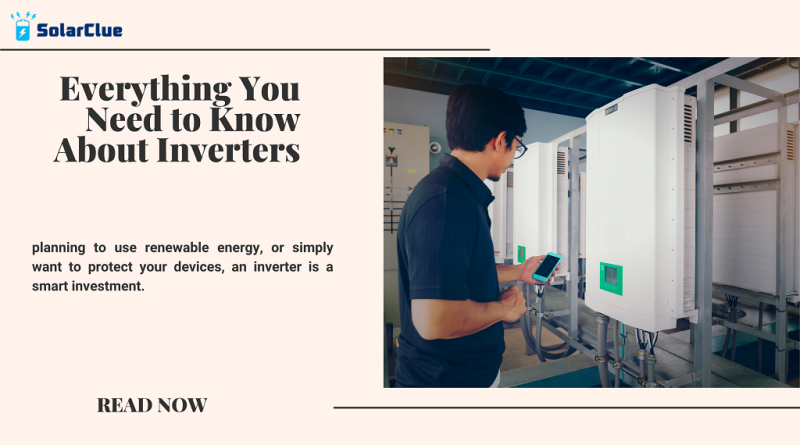Everything You Need to Know About Inverters
Have you ever experienced a sudden power outage in the middle of an important task? Or maybe you’ve worried about how to keep your home appliances running smoothly during a blackout. If so, then you’ve probably heard of inverters. But what exactly are they, and why are they so important? This blog will explain all about inverters in simple, easy-to-understand terms. Whether you’re considering buying one or just curious, this guide will help you understand everything you need to know.
Table of Contents
Introduction to Inverters
Inverters are becoming an essential part of modern households and businesses, especially in areas prone to power cuts. They act as a bridge between your power source and the devices that need electricity to run. In simple words, an inverter is a device that converts direct current (DC) into alternating current (AC). Why is this important? Because most of the electrical appliances we use, like refrigerators, TVs, and lights, operate on AC power, while backup power sources like batteries and solar panels provide DC power.
So, when the power goes out, an inverter steps in, converting the stored DC power into AC, allowing your devices to keep running. It’s like having a backup generator, but much quieter and more efficient.
Why Do You Need an Inverter?
Inverters aren’t just for people who live in areas with frequent power outages. They offer several benefits, making them a valuable addition to any home or business:
1.Uninterrupted Power Supply: The primary purpose of an inverter is to provide backup power during outages. This ensures that your essential devices, such as lights, fans, and even your Wi-Fi, continue to work.
2.Powering Essential Appliances: Inverters can power various household appliances like televisions, computers, and refrigerators, depending on their capacity. This is especially useful during long power cuts.
3.Supporting Solar Power Systems: If you have solar panels, an inverter is necessary to convert the DC power generated by the panels into AC power for household use.
4.Protection from Voltage Fluctuations: Inverters can also help protect your devices from voltage fluctuations, which can damage sensitive electronics.
How Does an Inverter Work?
To understand all about inverters, let’s dive into how they work. Here’s a simple breakdown:
1.Source of Power: Inverters are usually connected to a battery or a solar panel that stores DC power.
2.Conversion Process: The inverter converts the DC power into AC power.
3.Power Distribution: The AC power is then used to run your household appliances.
During a power cut, the inverter automatically switches from the main grid to its backup power source (the battery or solar panel) to keep your devices running without any interruption.
Types of Inverters
There are different types of inverters, each designed for specific uses. Understanding these types will help you choose the right one for your needs.
- Pure Sine Wave Inverters:
- Produces a smooth wave of AC power, similar to the electricity supplied by the grid.
- Suitable for all kinds of appliances, especially sensitive electronics.
- Slightly more expensive but highly reliable and safe.
- Modified Sine Wave Inverters:
- Produces a less smooth wave of AC power.
- Can power most appliances, but may not be ideal for sensitive devices like medical equipment.
- More affordable but less efficient than pure sine wave inverters.
- Square Wave Inverters:
- Produces a basic wave of AC power, which is not suitable for most household appliances.
- Mainly used for simple devices like incandescent bulbs or old motors.
- The cheapest option but not recommended for modern electronics.
| Type of Inverter | Best For | Cost | Efficiency |
|---|---|---|---|
| Pure Sine Wave Inverter | All appliances, including sensitive devices | High | Excellent |
| Modified Sine Wave Inverter | Basic household appliances | Medium | Good |
| Square Wave Inverter | Simple devices like old motors or bulbs | Low | Low |
How to Choose the Right Inverter
When choosing an inverter, there are a few key factors to consider:
1.Power Requirement: Calculate the total power required by the appliances you want to run during a power cut. This will help you determine the inverter’s capacity, usually measured in kilovolt-amperes (kVA).
2.Battery Capacity: The battery capacity, measured in amp-hours (Ah), determines how long the inverter can power your devices. Larger batteries can run your appliances for a longer time.
3.Type of Inverter: Depending on the appliances you need to power, choose between pure sine wave, modified sine wave, or square wave inverters. For most modern homes, a pure sine wave inverter is the best choice.
4.Budget: Inverters vary in price, depending on their type and capacity. It’s important to balance your budget with your power needs to get the most suitable inverter.
Advantages of Using an Inverter
1.Reliability: Inverters provide a reliable backup power source during power outages, ensuring that your daily life isn’t disrupted.
2.Energy Efficiency: Inverters, especially those paired with solar panels, can help reduce electricity bills by utilizing renewable energy.
3.Portability: Some inverters are portable, allowing you to take them on trips or use them in locations without a power supply.
4.Environmentally Friendly: Inverters that use solar energy contribute to reducing your carbon footprint.
Common Misconceptions About Inverters
1.Inverters are the same as generators: While both provide backup power, inverters are much quieter, more efficient, and often more environmentally friendly than generators.
2.All inverters are expensive: The cost of inverters varies widely based on type and capacity. There are budget-friendly options available that still offer great value.
3.Inverters can run all appliances indefinitely: The duration an inverter can power appliances depends on its capacity and battery size. Larger loads and longer power cuts require bigger batteries.
Conclusion
Understanding all about inverters can make a significant difference in how you manage power in your home or business. Whether you’re looking for a reliable backup power solution, planning to use renewable energy, or simply want to protect your devices, an inverter is a smart investment. With the right inverter, you can enjoy peace of mind knowing that your essential devices will stay powered, no matter what. So, the next time the lights go out, you’ll know exactly how your inverter is keeping things running smoothly!
Visit SolarClue® to see the best Solar Inverter. SolarClue® actively sells solar energy products at discounts of up to 50% on its online marketplace.
FAQs
- What is an inverter?
- An inverter is a device that converts DC power (from batteries or solar panels) into AC power, which is used by household appliances.
- How do I determine the right inverter size for my home?
- Calculate the total wattage of the appliances you need to power during an outage and choose an inverter with a capacity that can handle that load.
- Can an inverter power my entire house?
- It depends on the inverter’s capacity and your home’s power requirements. Some inverters can power an entire house, but others may only support essential appliances.
- Do inverters require maintenance?
- Yes, regular maintenance, such as checking battery health and keeping connections clean, can extend the lifespan of your inverter.
- Can I use an inverter with solar panels?
- Absolutely! In fact, inverters are essential for converting the DC power generated by solar panels into usable AC power for your home.



